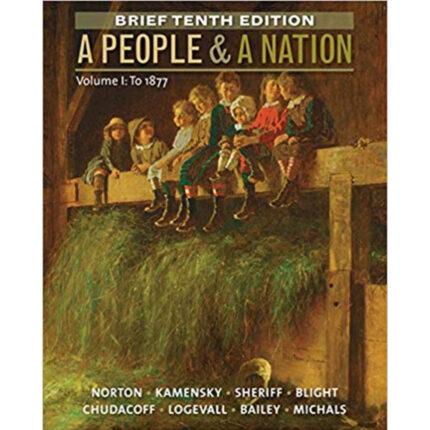The Art Of Being Human 11th Edition By Richard – Test Bank
Test Bank Chapter 11
MULTIPLE CHOICE
1. The work of sin, punishment, and redemption that maps out the Christian scheme of Hell, Purgatory, and Paradise is described in
a. Swift’s “A Modest Proposal.”
b. Rand’s “The Virtue of Selfishness.”
c. Dante’s Divine Comedy.
d. Milton’s Paradise Lost.
Answer: c
Question Title: TB_11_01_Morality and the Arts_Remember_LO 11.5
Learning Objective: LO 11.5 Discuss the impact of the arts on moral beliefs, and the impact of moral beliefs on the arts.
Topic: Morality and the Arts
Skill Level: Remember the Facts
Difficulty Level: Easy
Page Number: 325
2. According to Kant’s view, the inborn sense of actions and choices as either morally acceptable or unacceptable is
a. the categorical imperative.
b. utilitarianism.
c. altruism.
d. moral relativism.
Answer: a
Question Title: TB_11_02_Moral Alternatives to Self-Interest_Remember_LO 11.3
Learning Objective: LO 11.3 Identify and discuss the key arguments of utilitarianism, Kant’s categorical imperative, and altruism.
Topic: Moral Alternatives to Self-interest
Skill Level: Remember the Facts
Difficulty Level: Easy
Page Number 320
3. In The Prince, Machiavelli believes the best way to rule is to
a. trust the masses to make their own decisions.
b. apply impartial religious principles.
c. determine the greatest good for the greatest number of people.
d. hold the masses in a state of awe.
Answer: d
Question Title: TB_11_03_The Morality of Self-Interest_Remember_LO 11.2
Learning Objective: LO 11.2 Discuss the key arguments for accepting the contention that morality is always based in self-interest.
Topic: The Morality of Self-Interest
Skill Level: Remember the Facts
Difficulty Level: Easy
Page Number: 315
4. Kant argued that the categorical imperative
a. resulted from keeping subjects in awe.
b. was based solely on reason.
c. provided the greatest good for the greatest number.
d. resulted from following self-interest.
Answer: b
Question Title: TB_11_04_Moral Alternatives to Self-Interest_Remember_LO 11.3
Learning Objective: LO 11.3 Identify and discuss the key arguments of utilitarianism, Kant’s categorical imperative, and altruism.
Topic: Moral Alternatives to Self-Interest
Skill Level: Remember the Facts
Difficulty Level: Easy
Page Number: 320
5. Plato believed that ideal rulership would
a. hold subjects in a state of awe.
b. come from a philosopher king who governed by reason.
c. allow subjects to rule themselves.
d. determine the greatest good for the greatest number of people.
Answer: b
Question Title: TB_11_05_The Morality of Self-Interest_Remember_LO 11.2
Learning Objective: LO 11.2 Discuss the key arguments for accepting the contention that morality is always based in self-interest.
Topic: The Morality of Self-Interest
Skill Level: Remember the Facts
Difficulty Level: Easy
Page Number: 312
6. The Christian moral instruction to turn the other cheek was foreshadowed in
a. Plato’s Republic.
b. the Code of Hammurabi.
c. the Buddhist moral treatise Dhammapada.
d. the Ten Commandments.
Answer: c
Question Title: TB_11_06_Morality and Religion_Remember_LO 11.4
Learning Objective: LO 11.4 Explain the relationship between religion and morality.
Topic: Morality and Religion
Skill Level: Remember the Facts
Difficulty Level: Easy
Page Number: 324
7. According to John Stuart Mill, “the sole end for which power can be rightfully exercised over any member of a civilized community against his will” is to
a. prevent harm to others.
b. keep that member’s actions in line with a universal rule that binds all.
c. encourage actions based on reason alone.
d. balance the numerical value of pleasure against the numerical value of pain.
Answer: a
Question Title: TB_11_07_Moral Alternatives to Self-Interest_Remember_LO 11.3
Learning Objective: LO 11.3 Identify and discuss the key arguments of utilitarianism, Kant’s categorical imperative, and altruism.
Topic: Moral Alternatives to Self-Interest
Skill Level: Remember the Facts
Difficulty Level: Easy
Page Number: 319-320
8. A network of related values on which choices of what is right are based is called
a. moral relativism.
b. a moral system.
c. morality.
d. a categorical imperative.
Answer: b
Question Title: TB_11_08_Defining Morality_Remember_LO 11.1
Learning Objective: LO 11.1 Identify the major queries of moral philosophy.
Topic: Defining Morality
Skill Level: Remember the Facts
Difficulty Level: Easy
Page Number: 308
9. The idea that time, culture, and situation play roles in what is right and wrong is known as
a. moral absolutism.
b. utilitarianism.
c. moral imperativism.
d. moral relativism.
Answer: d
Question Title: TB_11_09_Moral Relativism _Remember_LO 11.6
Learning Objective: LO 11.6 Analyze the arguments supporting moral relativism and the dangers that relativism implies.
Topic: Moral Relativism
Skill Level: Remember the Facts
Difficulty Level: Easy
Page Number: 329
10. Which statement is based on moral relativism?
a. “The rules that apply to women must also apply to men.”
b. “Neither men nor women should be able to do as they please.”
c. “True justice can be obtained only when we maximize happiness for men and women.”
d. “The social conditions experienced by women might lead to a different sense of what is right and wrong.”
Answer: d
Question Title: TB_11_10_Moral Relativism_Remember_LO 11.6
Learning Objective: LO 11.6 Analyze the arguments supporting moral relativism and the dangers that relativism implies.
Topic: Moral Relativism
Skill Level: Remember the Facts
Difficulty Level: Easy
Page Number: 329













Reviews
There are no reviews yet.